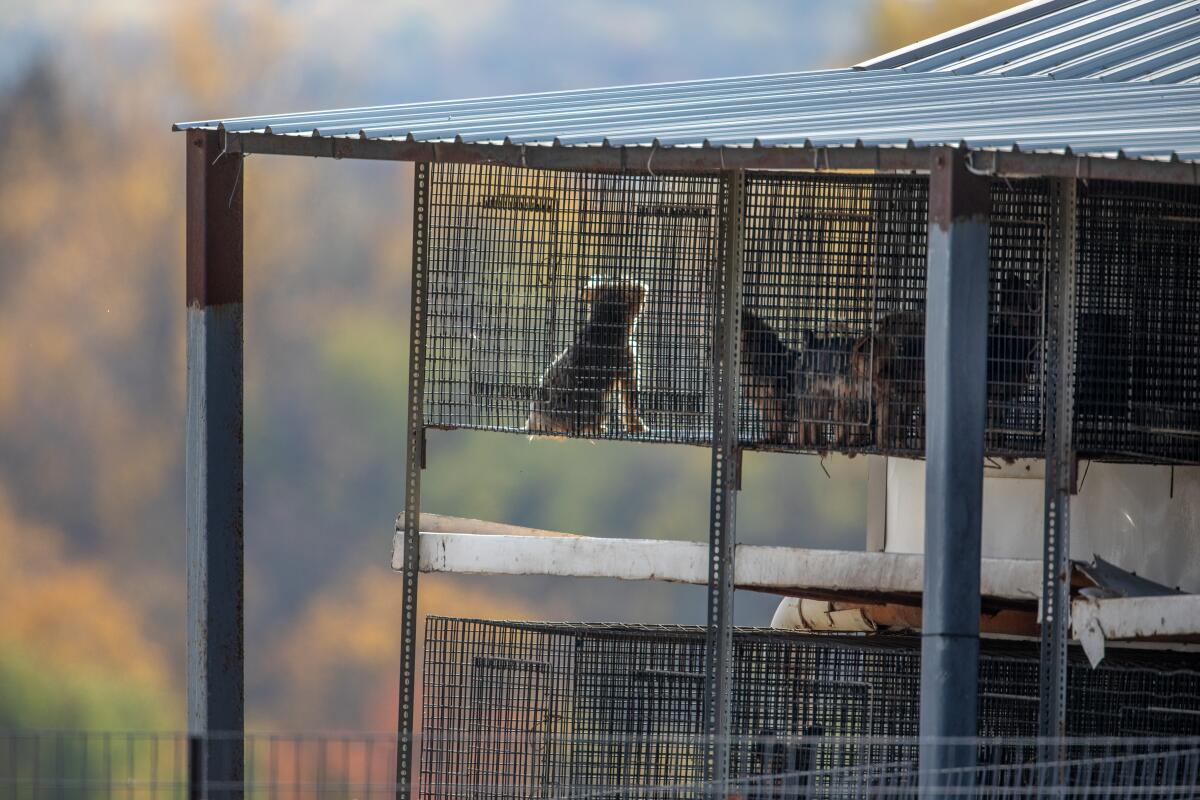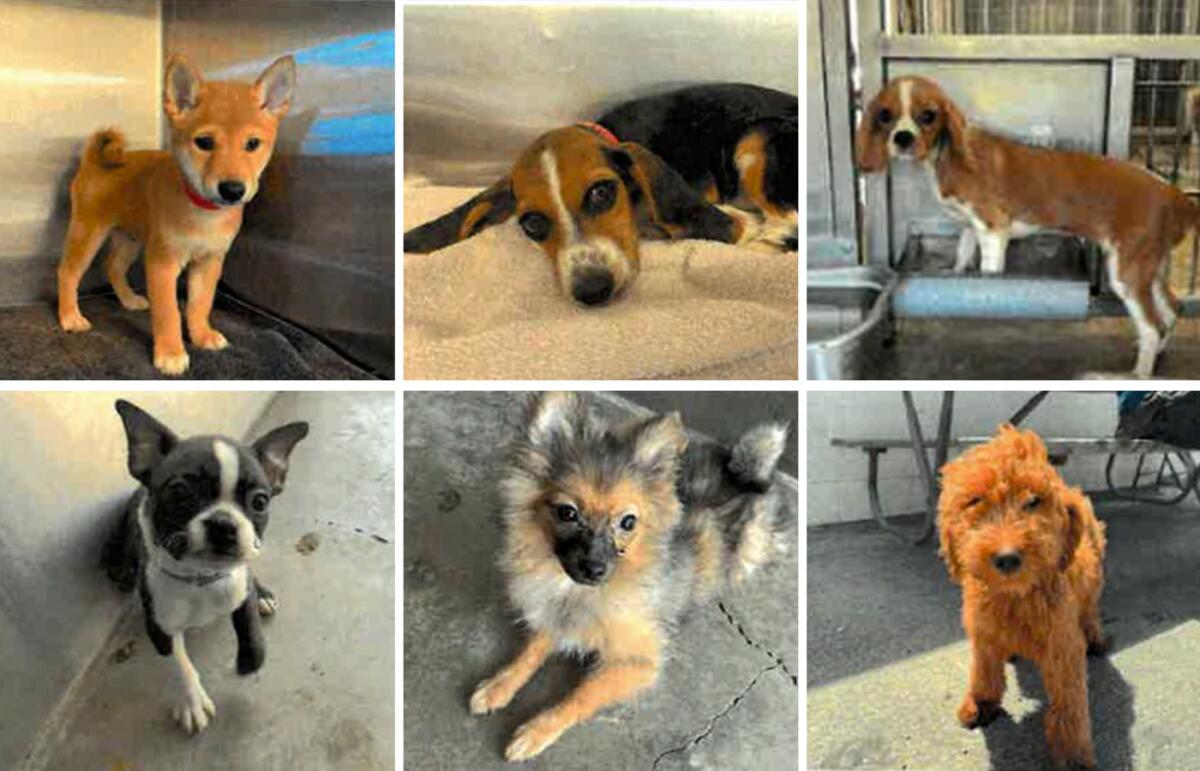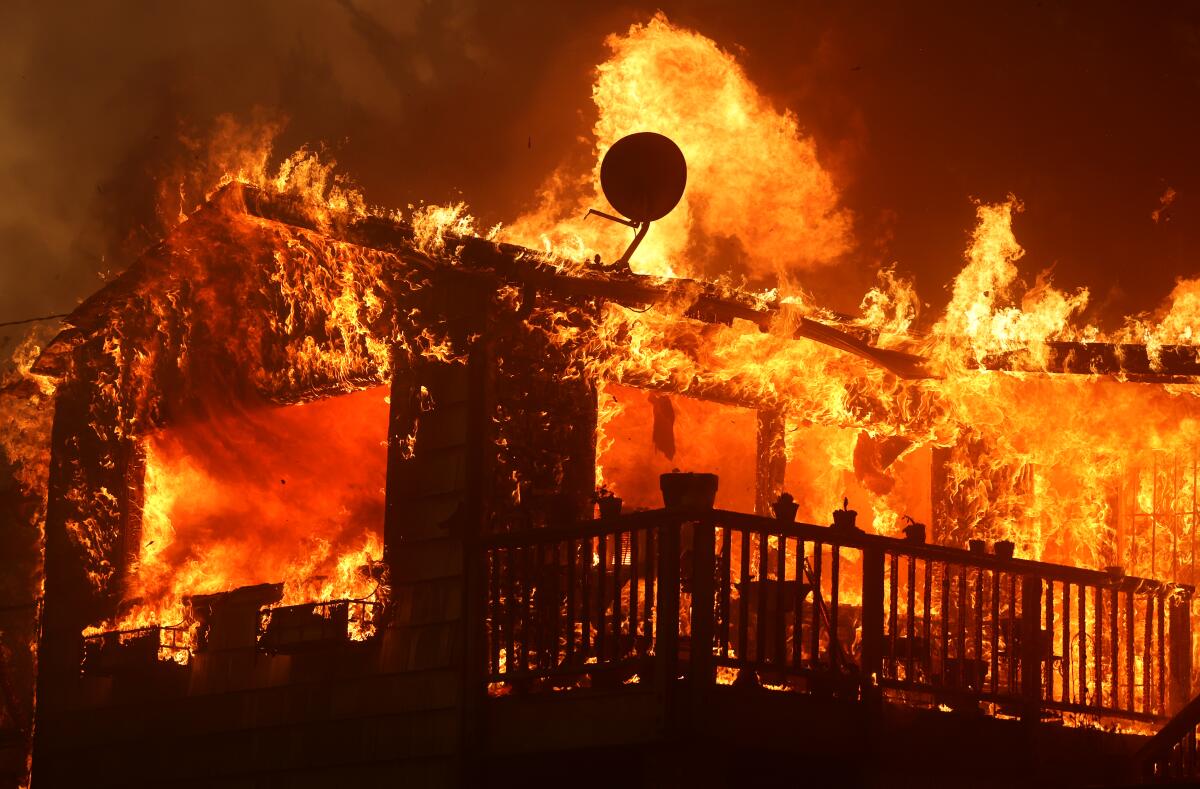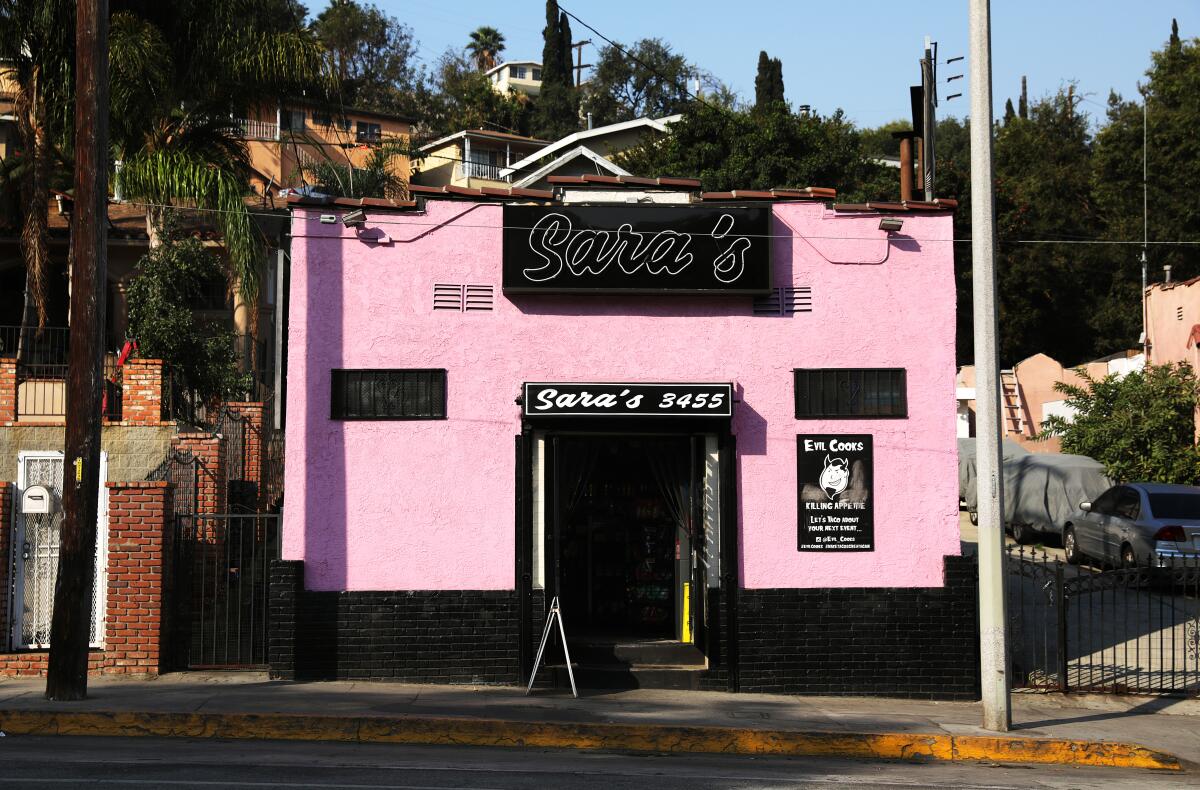Takeaways from our investigation revealing California’s brutal underground market for puppies

- Share via
Good morning. It’s Thursday, Sept. 12. Here’s what you need to know to start your day.
- California imports thousands of puppies from out-of-state breeders. Times reporters uncover the industry’s dark side.
- The Bridge fire has grown more than 12 times in size, prompting more evacuations in mountain communities.
- Feeling climate anxiety? These books offer glimmers of hope — and much-needed wisdom.
- And here’s today’s e-newspaper
You're reading the Essential California newsletter
Our reporters guide you through our biggest news, features and recommendations every morning
You may occasionally receive promotional content from the Los Angeles Times.
Behind California’s brutal underground market for dogs
A word of warning to anyone who loves and/or lives with dogs: This edition may be a difficult read.
I’ll wager that‘s a lot of you: An estimated 62 million U.S. households have a dog. Los Angeles topped a U.S. News list of the U.S. cities with the most dogs, which also included San Diego (#5), San Francisco (#10) and Sacramento (#19).
But the multibillion-dollar pet industry that connects dogs with forever homes has a dark underbelly.
Over 14 months, Times investigative reporters Melody Gutierrez and Alene Tchekmedyian uncovered a multi-state puppy pipeline in which dogs suffer from neglect, malnourishment and illness.
They traced thousands of puppies from mass breeding operations in Midwestern states to California breeders, some of whom claim to raise their dogs locally.
“The trail of imported dogs — some from operators cited by state and federal officials for neglect — persists, despite California’s efforts to stem the flow,” Alene and Melody wrote.
To help tell the story, they followed one pup’s journey.
A Boston terrier puppy was born at a breeding facility in Indiana, sold to a broker and put on a transport van in Missouri. After a two-day journey to the Riverside County city of Norco, the terrier joined dozens of other puppies and kittens living in cages in a sweltering garage, neglected and low on water, according to the driver who transported the pup and later reported the neglect to city authorities.

The terrier and 41 other dogs and cats were later seized by Norco Animal Control officers. She was taken to a local animal shelter, where she was named Lola and later adopted.
“These puppies can go from a breeder to a broker, sometimes to another broker, before they end up in homes,” Melody told me this week. “That was one of the more surprising things to me. That pipeline to California wasn’t a straight line.”
Problematic breeders and brokers continue to operate.
After Lola and 41 other animals were seized, a woman named Monique Matthews was charged with two counts of animal cruelty and ordered not to possess any animals during her case.
But aliases The Times linked to her continued to show up on travel certificates issued in Iowa, Missouri and Kansas.
And Alene later confronted a dog seller who six people identified as Monique Matthews (though she denied it) in a parking lot.
Matthews had also previously been convicted of misdemeanor animal neglect and found liable in small-claims court over a sick puppy she sold that later died.
The ability in the industry to skirt accountability for treatment of dogs and other animals in their care stood out to Alene.
“We looked through a lot of inspection reports of breeding facilities across the country,” she said. “I was very surprised at how some of them can be cited for such severe animal welfare violations and continue to operate as a business.”
Despite laws on the books, California is largely failing to regulate the market.
The California Department of Food and Agriculture deletes state-mandated travel certificates meant to track where puppies are coming from, where they’re going and their health status.
“With no clear way to trace their pet’s origin, buyers are often fooled into thinking they’re supporting reputable, local breeders, but are instead fueling a trade in which some puppies are born and raised in horrific conditions,” Melody and Alene wrote.
Alene explained why the state deletes these records:
“The law doesn’t require them to receive them or keep them. The records are supposed to go to the counties, and the counties are supposed to get them from the people importing the dogs. And few people that are importing dogs actually provide them to the counties.”
How can Californians looking to add a dog to their family avoid fueling this pipeline?
Many animal welfare advocates urge people to adopt dogs from shelters rather than buy them from breeders.
But if you insist on seeking a puppy from a breeder, here are some tips Alene and Melody learned.
- Meet breeders in person at their homes to verify their identity and the puppies’ living conditions. Without that, it can be difficult to know for certain who you’re buying from. “A lot of the purchases for people we ended up interviewing … were done in parking lots, which is actually against the law in California,” Melody shared. “But most people don’t know that.”
- Ask to see both the puppies’ parents, which typically live with their offspring at family-run home breeder businesses. “If there’s no mom or dad, you need to question where the dogs came from,” Frank Scagnamiglio, former head of Norco Animal Services, told Alene and Melody. “Might be a puppy mill.”
You can read my colleagues’ full investigation here. And there’s more to explore of this project:
- See if your dog’s microchip number appears in travel documents obtained by The Times
- More details about why the state is purging dogs’ travel records
- Learn more about how Alene and Melody reported this story
Today’s top stories

Fires besiege Southern California mountain communities, burning homes and injuring at least 13 people
- The Bridge fire has grown more than 12 times in size, prompting evacuations in a number of mountain hamlets, towns and resorts.
- “The red embers rained down on us, bits of timber, as we were loading the car up to leave,” said one woman who fled her home in Wrightwood. “It was so scary.”
- At least four fires are burning within 100 miles of Los Angeles, stretching fire resources across the region thin.
- In Running Springs, a mountain town that dealt with a deadly blizzard last year, some residents are defying evacuation orders as firefighters battle the Line fire.
- The coming months could be even more dangerous due to the impending arrival of fire-fanning Santa Ana winds and two years of overgrown vegetation, experts said.
A beloved bear was euthanized after crashing a picnic, fueling a debate over humanity’s coexistence with wild animals
- The bear, nicknamed Victor, was notorious for mooching meals at Mammoth Lakes campgrounds, but when he crashed a steak and wine dinner, things escalated quickly.
- Reports of human-black bear interactions have been on the rise across the country for decades. Last year, a woman’s death in Sierra County marked California’s first fatal black bear attack.
Diamonds, pearls and artwork owned by the late Sen. Dianne Feinstein will be auctioned in L.A. next month
- The Oct. 8 auction will include artwork from the glassblower Dale Chihuly and the 15th century Italian painter Neri Di Bicci, as well as signed books and documents from famous Democrats, including several presidents.
- Feinstein, who died last year at age 90, “cherished the items she collected and decorated her homes with,” said her daughter, Katherine Feinstein.
More big stories
- The first murder case against an accused fentanyl dealer in L.A. County is put to test.
- A judge struck down L.A.’s ban on new oil drilling.
- Lawmakers are taking a “creative” approach to enforcing heat safety rules for California farmworkers.
- Can anything slow fast fashion down? Lawmakers are giving it a go.
- Three new outbreaks of H5N1 bird flu have been identified in California dairy herds.
- Vet care costs are skyrocketing in California.
Get unlimited access to the Los Angeles Times. Subscribe here.
Commentary and opinions
- Here’s how Kamala Harris de-normalized Trump in less than 2 hours, Mary McNamara writes.
- Trump was Trump in his debate with Harris — which is why he came across so poorly, Mark Z. Barabak writes.
- At the debate, Trump confessed he’s unfit and unprepared, columnist LZ Granderson writes.
- Here’s what Taylor Swift’s Harris endorsement means for her politics and career, writes pop music critic Mikael Wood.
- Forget all the injuries — the Dodgers are going to win the World Series, columnist Dylan Hernández writes.
Today’s great reads
Sex tourism in Indonesia sells itself as Islamic temporary marriage. Saudi sex tourists are buying weeklong marriages to young women in Indonesia. It’s an economic lifeline for villages. For the women, it’s “torture.”
Other great reads
- In Gaza, a rush campaign to vaccinate nearly 650,000 children against polio is nearing completion despite many obstacles.
- Aging, overworked and underfunded: NASA faces a dire future, according to experts.
- In China’s youth retreat centers, millennials seek to escape the grind.
How can we make this newsletter more useful? Send comments to essentialcalifornia@latimes.com.
For your downtime

Going out
- ? Here’s where you can find the most exciting food pop-ups in L.A. — from an organic wine bar in West L.A. to a cider house in Lincoln Heights.
- ? Slipknot, which performs at the Intuit Dome Sept. 13-14, celebrates the 25th anniversary of its metal debut.
- ? A prolific bread specialist will expand its reach with a pizzeria in Highland Park.
Staying in
- ? Who’s going to have a big night at the Emmys this Sunday? Times columnist Glenn Whipp provides his final predictions.
- ? Feeling climate anxiety? These books offer glimmers of hope — and much-needed wisdom.
- ? A narrator brings us along as she makes meaning from a traumatic childhood in “Us Fools,” the debut novel from Nora Lange.
- ??? Here’s a recipe for golden oat milk creme pies.
- ?? Get our free daily crossword puzzle, sudoku, word search and arcade games.
And finally ... from our archives
On this day in 2013, NASA confirmed its Voyager 1 space probe had left our solar system, becoming the first man-made object to travel into intersteller space. The probe was launched in 1977.
“Voyager has boldly gone where no probe has gone before, marking one of the most significant technological achievements in the annals of the history of science,” said John Grunsfeld, NASA’s then-associate administrator for the Science Mission Directorate.
Have a great day, from the Essential California team
Ryan Fonseca, reporter
Defne Karabatur, fellow
Andrew Campa, Sunday reporter
Hunter Clauss, multiplatform editor
Christian Orozco, assistant editor
Stephanie Chavez, deputy metro editor
Karim Doumar, head of newsletters
Check our top stories, topics and the latest articles on latimes.com.
Sign up for Essential California
The most important California stories and recommendations in your inbox every morning.
You may occasionally receive promotional content from the Los Angeles Times.




